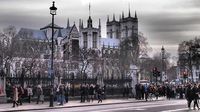The UK’s economy has shown signs of resilience as it navigates the aftermath of the pandemic and geopolitical tensions, with both the services and construction sectors contributing positively to GDP in the final quarter of 2024. According to the Office for National Statistics, the British economy grew by 1.1% on an annual basis in 2024, an upward revision from a previous estimate of 0.9%. This growth compares favorably to the 0.4% recorded in 2023.
In the last quarter of 2024, the economy expanded by 0.1% on a quarterly basis, reaffirming initial estimates that were in line with market expectations. The services sector saw a modest advance of 0.1%, revised down from 0.2%, with significant contributions from human health activities and social work. Meanwhile, the construction industry rose by 0.3%, providing a much-needed boost.
However, the production sector faced challenges, with a downward revision showing a drop of 0.4%, instead of the initially reported 0.8%. This decline was primarily attributed to a fall in the manufacturing of metal products and basic metals, along with a decrease in transport equipment production. Additionally, net trade fell during the final three months of 2024, along with gross fixed capital formation, indicating a slowdown in investment in fixed capital assets.
Household consumption, a key driver of the economy, grew by 0.1% in the fourth quarter, revised up from a flat reading. This increase was primarily fueled by higher spending on hotels, restaurants, and housing. Real government consumption expenditure also saw a rise of 0.5%, reflecting increased spending on defense and public administration.
The year-on-year growth rate for the UK economy in real terms for the final quarter of 2024 was recorded at 1.5%, slightly exceeding the first estimate of 1.4%. This marked the strongest yearly growth rate in two years, driven largely by higher government spending and fixed investment. Despite these encouraging figures, concerns linger regarding the impact of escalating geopolitical tensions on consumer sentiment in the months ahead.
Russ Mould, investment director at AJ Bell, noted, "A jump in retail sales in February and confirmation the UK economy managed to grow in the final quarter of 2024 were treated as small wins by the market. While not earth-shattering data, investors are taking any nuggets of good news they can get in the current fragile environment." This sentiment reflects a cautious optimism among investors, as they remain wary of potential economic slowdowns.
Adding to the complexities of the UK’s economic landscape, the Office for Budget Responsibility recently halved its growth forecast for 2025, coinciding with Chancellor Rachel Reeves’ Spring Statement. This adjustment highlights the ongoing uncertainties that could affect economic recovery.
Meanwhile, London's tourism sector is also on the mend, with an estimated 41.2 million visitors projected for 2024. However, the industry remains fragile, and stakeholders are concerned about the potential impact of a proposed new 5% tourist tax. UKHospitality, the national organization representing hotels and restaurants, warned that such a tax could be "extremely damaging," particularly as the sector strives to recover from pandemic-related losses.
Mayor Sadiq Khan has reignited the conversation around a tourist tax, advocating for a levy on overnight stays similar to those in Paris, Barcelona, and Venice. His office estimates that this tax could generate around £240 million (€285 million) annually, which would fund essential services used by both locals and tourists, including public transport, sanitation, and heritage maintenance.
Khan reassured critics that revenues from the tax would be reinvested directly into London’s tourism infrastructure, benefiting hotels, Airbnbs, and guests alike. He argues that the policy would create a cleaner, safer, and more welcoming environment for international travelers, particularly in high-traffic areas like Westminster and the South Bank.
In comparison, tourists in Paris pay up to €16 per night for luxury accommodations, while Barcelona imposes a fee of around €4 per night, plus a regional tourism fee. Venice has taken a stricter approach, introducing a €10 day-tripper tax in 2025 to manage overwhelming crowds. These cities have successfully reinvested tax revenues into public transport and local beautification efforts, setting a precedent for urban centers grappling with high visitor volumes.
The debate surrounding the proposed tourist tax in London mirrors tensions seen in other cities. In Barcelona, hotel operators have opposed repeated increases in tourism levies, arguing that they contribute to "fiscal suffocation." Similarly, small businesses in Wales protested a proposed tourist tax by shutting down for a day, voicing concerns about the impact on local economies already struggling to recover.
As the UK government explores similar taxes in Edinburgh and Bath, resistance remains strong among sectors that depend heavily on volume-based tourism. For travelers considering a stay in London in late 2025 or beyond, the introduction of a tourist tax could significantly alter budgeting and planning for accommodations. While a 5% fee might seem modest, it could become substantial for multi-night bookings or luxury stays.
Industry experts stress that clear communication and transparency will be vital for traveler acceptance of the tax. If perceived as a contribution to the city’s upkeep rather than a bureaucratic surcharge, travelers may be more willing to embrace it, especially if they can see tangible benefits in the form of improved public services and cleaner streets.
Globally, tourist taxes are increasingly viewed as necessary mechanisms for balancing tourism growth with urban sustainability. As cities compete for tourist dollars, they are also held accountable for managing the social and environmental footprints of mass tourism. London, with its blend of historical grandeur and modern vibrancy, is not immune to these pressures.
Ultimately, whether or not the tourist tax moves forward, the debate has sparked broader conversations about how the UK supports and funds its visitor economy. With international travel on the rise and infrastructure aging under pressure, strategies that combine economic resilience with tourist satisfaction may soon become the norm. As one of the most iconic capital cities in the world, London’s approach will likely influence how other UK cities and tourist regions tackle similar challenges in the years ahead.






